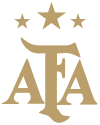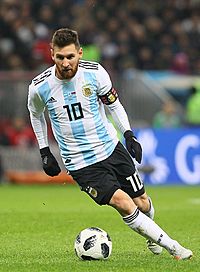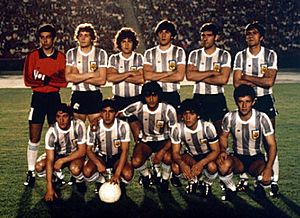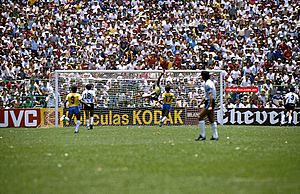Argentina national under-20 football team facts for kids
 |
|||||||||||||||||||||||||||||
| Nickname(s) | Albiceleste (The White and Sky Blue) Los Cebollitas (Little Onions) Los Pibes (The Kids) |
||||||||||||||||||||||||||||
|---|---|---|---|---|---|---|---|---|---|---|---|---|---|---|---|---|---|---|---|---|---|---|---|---|---|---|---|---|---|
| Association | Asociación del Fútbol Argentino (Argentine Football Association) |
||||||||||||||||||||||||||||
| Confederation | CONMEBOL (South American Football Confederation) |
||||||||||||||||||||||||||||
| Head coach | Diego Placente | ||||||||||||||||||||||||||||
| Captain | Claudio Echeverri | ||||||||||||||||||||||||||||
| FIFA code | ARG | ||||||||||||||||||||||||||||
|
|||||||||||||||||||||||||||||
| First international | |||||||||||||||||||||||||||||
(Buenos Aires, Argentina; 27 February 1951) |
|||||||||||||||||||||||||||||
| Biggest win | |||||||||||||||||||||||||||||
(São Paulo, Brazil; 4 May 1963) |
|||||||||||||||||||||||||||||
| Biggest defeat | |||||||||||||||||||||||||||||
(Quito, Ecuador; March 8, 1981) (Quito, Ecuador; March 5, 1981) |
|||||||||||||||||||||||||||||
| FIFA U-20 World Cup | |||||||||||||||||||||||||||||
| Appearances | 18 (first in 1979) | ||||||||||||||||||||||||||||
| Best result | Champions (1979, 1995, 1997, 2001, 2005, 2007) | ||||||||||||||||||||||||||||
| CONMEBOL Sub 20 | |||||||||||||||||||||||||||||
| Appearances | 29 (first in 1958) | ||||||||||||||||||||||||||||
| Best result | Champions (1967, 1997, 1999, 2003, 2015) | ||||||||||||||||||||||||||||
|
Medal record
|
|||||||||||||||||||||||||||||
The Argentina national under-20 football team is a special team that represents Argentina in big football tournaments for players under 20 years old. These tournaments are organized by FIFA, the world's football governing body.
Argentina is super successful in the FIFA U-20 World Cup, having won the championship a record six times! The team has played in 18 of the 25 World Cup events. They even won their very first one in 1979. Argentina also won five South American Youth Championships.
Many famous Argentine football stars started their careers in this youth team. Some of these amazing players include Sergio Agüero, Pablo Aimar, Ángel Di María, Diego Maradona, Javier Mascherano, and Lionel Messi. Other great players like Juan Román Riquelme, Carlos Tevez, and Sergio Romero also played for the U-20 team.
Contents
History of Argentina's U-20 Football Team
Winning the First World Title in 1979
Argentina did not play in the first FIFA World Youth Championship in 1977. However, they joined the next tournament in Japan and won it! The team, coached by César Luis Menotti, played with a fantastic style. They kept the ball a lot, passed well, and scored 20 goals in total.
Diego Maradona and Ramón Díaz were the team's biggest stars. This was Maradona's first official tournament with a national team. He played incredibly well, showing off his amazing dribbling and scoring six goals. Ramón Díaz was the top scorer with eight goals. Maradona was named the best player of the tournament.
Argentina started strong, beating Indonesia 5–0. They also defeated Yugoslavia 1–0 and Poland 4–1. They won their group easily. In the knockout rounds, they beat Algeria 5–0 and their rival Uruguay 2–0. In the final on September 7, they beat the Soviet Union 3–1 to become world champions!
Challenges and a Strong Comeback in the 1980s
Argentina played in the 1981 tournament in Australia. They had a tough time, losing to Australia and drawing with England. They did not move past the first stage.
In the 1983 championship in Mexico, Argentina played much better. They reached the final against Brazil. They won all their group games without letting in any goals. They beat Netherlands and Poland in the knockout stages. In the final, Brazil won 1–0.
Argentina did not qualify for the 1985 and 1987 tournaments. They returned in Saudi Arabia, reaching the quarter-finals before losing to Brazil. The 1991 tournament in Portugal was difficult. Argentina finished last in their group. Some players were sent off for rough play, and FIFA gave the Argentine Football Association a two-year ban from the tournament.
The Golden Years with Coach José Pékerman
Because of the ban, Argentina missed the 1993 World Cup. The Argentine Football Association (AFA) hired José Pékerman as the new coach. He brought amazing success to the team.
Argentina won their second World Cup title in Qatar. They beat the Netherlands and Honduras in the group stage. In the knockout rounds, they defeated Cameroon, Spain, and then Brazil 2–0 in the final. This win was sweet revenge for their 1983 loss.
They won their third title in Malaysia. They beat Hungary and Canada. In the knockout stages, they defeated England, Brazil, and the Republic of Ireland. In the final, they beat Uruguay 2–1. The team also received the FIFA Fair Play Award for their good sportsmanship. Many talented players like Walter Samuel, Pablo Aimar, and Juan Román Riquelme were part of this team.
The 1999 World Championship in Nigeria was not as successful. Argentina was eliminated in the round of 16 by Mexico.
In 2001, Argentina hosted the Youth Championship and won their fourth title! They won all their games, including a huge 7–1 victory over Egypt. In the final, they beat Ghana 3–0. Javier Saviola was the top scorer with 11 goals and was named the best player. Argentina also received the FIFA Fair Play Award again. This was the last title won with José Pékerman as coach, marking the end of a brilliant era.
Continued Success from 2003 to 2007
After Pékerman, Hugo Tocalli became the coach. In the 2003 championship, Argentina reached the semi-finals. They finished in fourth place, with Fernando Cavenaghi as the top scorer.
In 2005, Francisco Ferraro became coach. Argentina won its fifth title at the World Championship in the Netherlands. They beat Colombia, Spain, and Brazil in tough knockout matches. In the final, they defeated Nigeria 2–1, with both goals scored by Lionel Messi. Messi was the team's star, winning both the top scorer and best player awards. Other notable players included Sergio Agüero and Fernando Gago.
Two years later, Argentina won their sixth title in a row at the 2007 FIFA U-20 World Cup in Canada. They had a strong run, beating Poland, Mexico, and Chile. In the final, they defeated the Czech Republic 3–1. Sergio Agüero was the top scorer with six goals and also won the Golden Ball as the best player. This team also featured future stars like Ángel Di María and Sergio Romero.
Recent Challenges Since 2009
After their amazing run, Argentina's U-20 team faced some challenges. They did not qualify for the World Cup in 2009 and 2013. They were also eliminated in the group stage in 2015 and 2017. In the 2025 FIFA U-20 World Cup in Chile, Argentina reached the final, finishing as runners-up.
Competitive Record in Major Tournaments
FIFA U-20 World Cup Performances
| Year | Round | Position | GP | W | D* | L | GS | GA |
|---|---|---|---|---|---|---|---|---|
| Did not qualify | ||||||||
| Champions | 1st | 6 | 6 | 0 | 0 | 20 | 2 | |
| First round | 9th | 3 | 1 | 1 | 1 | 3 | 3 | |
| Runners-up | 2nd | 6 | 5 | 0 | 1 | 13 | 2 | |
| Did not qualify | ||||||||
| Quarter-Finals | 7th | 4 | 1 | 0 | 3 | 3 | 4 | |
| First round | 14th | 3 | 0 | 1 | 2 | 2 | 6 | |
| Disqualified | ||||||||
| Champions | 1st | 6 | 5 | 0 | 1 | 12 | 3 | |
| 1st | 7 | 6 | 0 | 1 | 15 | 7 | ||
| Second round | 16th | 4 | 1 | 1 | 2 | 2 | 5 | |
| Champions | 1st | 7 | 7 | 0 | 0 | 27 | 4 | |
| Fourth Place | 4th | 7 | 5 | 0 | 2 | 12 | 8 | |
| Champions | 1st | 7 | 6 | 0 | 1 | 12 | 5 | |
| 1st | 7 | 6 | 1 | 0 | 16 | 2 | ||
| Did not qualify | ||||||||
| Quarter-Finals | 8th | 5 | 3 | 2 | 0 | 6 | 1 | |
| Did not qualify | ||||||||
| First round | 20th | 3 | 0 | 2 | 1 | 4 | 5 | |
| 17th | 3 | 1 | 0 | 2 | 6 | 5 | ||
| Round of 16 | 12th | 4 | 2 | 1 | 1 | 10 | 6 | |
| 9th | 4 | 3 | 0 | 1 | 10 | 3 | ||
| Runners-up | 2nd | 7 | 6 | 0 | 1 | 15 | 4 | |
| To be determined | ||||||||
| Total | 18/25 | 6 titles | 93 | 64 | 9 | 20 | 188 | 75 |
South American Championship U-20 Record
1Draws include knockout matches decided on penalty kicks.
Individual Awards for Argentine Players
Argentine players have won many special awards at the FIFA World Youth Cups.
| Year | Golden Ball (Best Player) | Golden Boot (Top Scorer) |
|---|---|---|
| 1979 | Diego Maradona | Ramón Díaz |
| 2001 | Javier Saviola | Javier Saviola |
| 2005 | Lionel Messi | Lionel Messi |
| 2007 | Sergio Agüero | Sergio Agüero |
Current Squad for the U-20 Team
The players listed below were part of the team for the 2025 FIFA U-20 World Cup, which took place between September 27 and October 19, 2025.
Caps (games played) and goals are correct as of October 1, 2025, after the match against Australia.
| No. | Pos. | Player | Date of birth (age) | Caps | Goals | Club |
|---|---|---|---|---|---|---|
| 1 | GK | Santino Barbi | 14 June 2005 | 10 | 0 | |
| 12 | GK | Álvaro Busso | 11 October 2006 | 0 | 0 | |
| 21 | GK | Alain Gómez | 3 March 2007 | 0 | 0 | |
|
|
||||||
| 2 | DF | Tobías Ramírez | 11 November 2006 | 15 | 0 | |
| 3 | DF | Julio Soler | 16 February 2005 | 13 | 0 | |
| 4 | DF | Dylan Gorosito | 3 February 2005 | 10 | 0 | |
| 6 | DF | Juan Villalba | 15 March 2006 | 9 | 0 | |
| 13 | DF | Valente Pierani | 22 February 2006 | 5 | 0 | |
| 14 | DF | Santiago Fernández | 30 March 2005 | 1 | 0 | |
| 16 | DF | Teo Rodríguez Pagano | 12 October 2005 | 9 | 1 | |
|
|
||||||
| 5 | MF | Milton Delgado | 16 June 2005 | 15 | 1 | |
| 8 | MF | Valentino Acuña | 27 January 2006 | 12 | 0 | |
| 10 | MF | Álvaro Montoro | 17 April 2007 | 3 | 0 | |
| 15 | MF | Tomás Pérez | 26 August 2005 | 4 | 1 | |
| 18 | MF | Tobías Andrada | 2 February 2007 | 2 | 0 | |
|
|
||||||
| 7 | FW | Maher Carrizo | 19 February 2006 | 14 | 6 | |
| 9 | FW | Alejo Sarco | 6 January 2006 | 2 | 3 | |
| 11 | FW | Ian Subiabre | 1 January 2007 | 10 | 5 | |
| 17 | FW | Mateo Silvetti | 14 January 2006 | 4 | 1 | |
| 19 | FW | Santino Andino | 25 October 2005 | 11 | 2 | |
| 20 | FW | Gianluca Prestianni | 31 January 2006 | 1 | 0 | |
Top Goalscorers for Argentina U-20

| Rank | Player | Year(s) | Total Goals |
|---|---|---|---|
| 1 | Lionel Messi | 2004–05 | 14 |
| 2 | Fernando Cavenaghi | 2003 | 12 |
| 3 | Javier Saviola | 2001 | 11 |
| 4 | Luciano Galletti | 1999 | 10 |
| Giovanni Simeone | 2015 | ||
| 5 | Ramón Díaz | 1979 | 8 |
| Bernardo Romeo | 1997 | ||
| 6 | Diego Maradona | 1979 | 7 |
| Juan Esnáider | 1991 | ||
| Juan Román Riquelme | 1997 | ||
| Pablo Aimar | 1997–99 | ||
| Marcelo Torres | 2017 | ||
| Lautaro Martínez | 2017 | ||
| 7 | Leonardo Biagini | 1995 | 6 |
| Sergio Agüero | 2007 | ||
| Ángel Correa | 2016 | ||
| Claudio Echeverri | 2025 |
Team Honours and Achievements
- FIFA U-20 World Cup
 Champions (6): 1979, 1995, 1997, 2001, 2005, 2007
Champions (6): 1979, 1995, 1997, 2001, 2005, 2007 Runners-up (2): 1983, 2025
Runners-up (2): 1983, 2025
- CONMEBOL Sub 20
 Champions (5): 1967, 1997, 1999, 2003, 2015
Champions (5): 1967, 1997, 1999, 2003, 2015 Runners-up (8): 1958, 1979, 1991, 1995, 2001, 2007, 2019, 2025
Runners-up (8): 1958, 1979, 1991, 1995, 2001, 2007, 2019, 2025 Third Place (8): 1971, 1975, 1981, 1983, 1987, 1988, 2005, 2011
Third Place (8): 1971, 1975, 1981, 1983, 1987, 1988, 2005, 2011
- Pan American Games
 Gold Medal (1): 2003
Gold Medal (1): 2003
- Toulon Tournament
 Champions (2): 1975, 1998
Champions (2): 1975, 1998 Runners-up (2): 1983, 1999
Runners-up (2): 1983, 1999 Third Place (2): 2003, 2009
Third Place (2): 2003, 2009
- Granatkin Memorial
 Champions (1): 2019
Champions (1): 2019
Former Squads
FIFA World Cup Squads
- 2023
- 2019
- 2017
- 2015
- 2011
- 2007
- 2005
- 2003
- 2001
- 1999
- 1997
- 1995
- 1991
- 1989
- 1983
- 1981
- 1979
Images for kids
See also
 In Spanish: Selección de fútbol sub-20 de Argentina para niños
In Spanish: Selección de fútbol sub-20 de Argentina para niños
- Argentina national football team
- Argentina national futsal team
- Argentina Olympic football team
- Argentina national under-17 football team
- Argentina national under-15 football team




